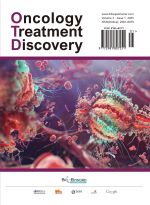Abstract
Objective: To explore the analysis of the application effect of tirilizumab combined with conventional chemotherapeutic drugs (paclitaxel + carboplatin) in the clinical treatment of advanced non-small cell lung cancer patients. Methods: Seventy-five patients with advanced non-small cell lung cancer who received chemotherapy treatment in a hospital from July 2023 to June 2024 were selected as objects, and grouped according to the choice of chemotherapy drugs, 37 patients who received regular chemotherapy drugs (paclitaxel + carboplatin) were included in the control group, and the other 38 patients who received tirilizumab + paclitaxel and carboplatin chemotherapy were included in the observation group, and the clinical efficacy of the two groups was compared. Results: Before treatment, the difference in serum tumour marker levels between the two groups was not significant (P > 0.05); after treatment, the levels of glycan antigen 125 (CA125), carcinoembryonic antigen (CEA), neuron-specific enolase NSE, and squamous carcinoembryonic antigen (SCC) in the patients of the two groups were significantly reduced, and the level in the observation group was lower than that in the control group (P < 0.05); before treatment, the level of immune function in the patients of the two groups, there was no statistically significant difference between the immune function levels of patients in the two groups (P > 0.05); after treatment, the levels of CD3+ , CD4+ and CD4+ /CD8+ were significantly higher and CD8+ were lower in the two groups, and the indicators of the observation group were better than those of the control group (P < 0.05); the incidence rate of toxic side effects such as nausea, vomiting, bone marrow suppression, liver and kidney function abnormalities, and so on, during the period of treatment of the observation group was significantly lower than that of the control group (5.26%) and the difference had a significant difference of 24.32%, the difference was statistically significant (P < 0.05); before treatment, there was no statistically significant difference in the quality of life SF-36 scores between the two groups (P > 0.05); after three courses of treatment, the quality of life SF-36 scores of the two groups were significantly higher, and the observation group was higher than the control group (P < 0.05). Conclusion: Tirilizumab combined with conventional chemotherapy drugs (paclitaxel + carboplatin) has remarkable efficacy in the treatment of advanced non-small cell lung cancer, which can effectively reduce the level of tumour markers and the risk of toxic and side effects, improve the immune function and enhance the quality of life of patients, and has positive clinical promotion value.
References
Zhan C, 2024, Effectiveness of Amlotinib and Paclitaxel Combined with Cisplatin Chemotherapy Regimen in the Treatment of Advanced Non-Small Cell Lung Cancer. Henan Medical Research, 33(3): 520–524.
Gong G, Lin Z, Lin J, et al., 2023, Efficacy of Carilizumab Combined with Paclitaxel and Carboplatin Chemotherapy in Advanced Non-Small Cell Lung Cancer. Chinese and Foreign Medical Research, 21(19): 149–152.
Xie Z, 2023, Clinical Application Study of Neoadjuvant Immunotherapy Combined with Chemotherapy in Locally Advanced Non-Small Cell Lung Cancer, thesis, Suzhou University.
Mao F, Shi X, Li X, et al., 2022, Clinical Efficacy of Intensity-Modulated Radiotherapy Combined with Paclitaxel + Cisplatin for Advanced Non-Small Cell Lung Cancer. Journal of Clinical Psychosomatic Diseases, 28(3): 133–136.
Dou Y, Jiang D, 2021, Research Progress of Small Molecule Anti-Angiogenic Drugs in Non-Small Cell Lung Cancer. Zhongguo Fei Ai Za Zhi, 24(1): 56–62.
Duma N, Santana-Davila R, Molina J, 2019, Non-Small Cell Lung Cancer: Epidemiology, Screening, Diagnosis, and Treatment. Mayo Clinic Proceedings, 94(8): 1623–1640.
Chen F, Liang H, Cheng G, et al., 2023, Recent Efficacy and Safety Study of Tirilizumab Combined with Platinum in the Treatment of Intermediate and Advanced Non-Small Cell Lung Cancer. Journal of Clinical and Experimental Medicine, 22(6): 583–587.
Yang F, Wang Y, Liang L, et al., 2022, Study on the Value of Macrophage Inhibitory Factor-1, Squamous Cell Carcinoma Antigen, and Cytokeratin 19 Fragment Antigen 21-1 Levels in the Diagnosis, Prognosis of Early Stage Non-Small Cell Lung Cancer. Journal of Practical Hospital Clinics, 19(3): 115–118.
Okiyama N, Tanaka R, 2022, Immune-Related Adverse Events in Various Organs Caused by Immune Checkpoint Inhibitors. Allergology International, 71(2): 169–178.
Zhu H, Yuan Y, Xu Y, et al., 2023, Literature Case Analysis of Serious Immune-Related Cutaneous Adverse Reactions Caused by Tirilizumab. Practical Drugs and Clinics, 26(10): 909–913.
Yang S, Zhu Y, 2023, Comparative Efficacy and Safety of Immunotherapy and Bevacizumab Combined with Chemotherapy in the First-Line Treatment of Advanced Driver Gene Wild-Type Non-Squamous Non-Small Cell Lung Cancer: A Reticulated Meta-Analysis. Chinese Journal of Evidence-Based Medicine, 23(11): 1275–1283.
Qin J, Yang F, Chen Q, et al., 2022, Net Meta-Analysis of First-Line Treatment Options for Advanced Driver Gene-Negative, PD-L1 Expression-Negative Non-Squamous Non-Small Cell Lung Cancer. Journal of Shandong University (Medical Edition), 60(7): 74–82.
